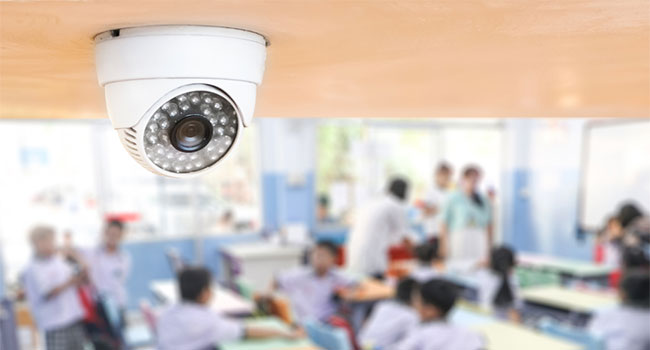
As Legislature Considers Moratorium on Facial Recognition, Technology Is Introduced in New York School
Parents and privacy experts are concerned about the data that is being collected on students as the state legislature considers legislation to limit school use of biometric tech.
- By Haley Samsel
- December 19, 2019
As school districts across New York state expand surveillance technology to combat vaping and ensure school safety, lawmakers and privacy experts are questioning the steps that administrators are taking to detect signs of illegal behavior and violence.
The conversation around the limits of security technology and the safeguards in place for student privacy has become particularly relevant in the state. Just last week, the State Education Department approved the first school facial recognition systems in Lockport, New York, The Albany Times Union reported.
The software, provided by Aegis, is meant to keep intruders from entering school facilities, and Lockport officials had to agree to not retain student data to earn the department’s approval.
“With these additional revisions, the Department believes that the Education Law ... issues it has raised to date relating to the impact on the privacy of students and student data appear to be addressed," Temitope Akinyemi, chief privacy officer for the department, said in a letter, according to the Times Union.
But the New York legislature could soon install moratoriums or more regulations on the uses of biometric technology in schools. Assemblywoman Monica Wallace has introduced legislation that would implement a one-year moratorium on facial recognition in New York schools while legislators and experts debate the best ways to apply it to campus security.
In addition, Gov. Andrew Cuomo enacted the Shield Act, broadening the definition of “private information” to include biometric data and regulating how companies can use that data, the Times Union reported.
“It is very concerning to me that kids are in the middle of this," state Sen. Kevin Thomas, the chair of the chamber's consumer protection committee and the main sponsor of the Shield Act, told the paper. "There is too much surveillance going on. We as a society are trading our privacy for security, and this has become the new norm."
A key concern of lawmakers, parents and privacy experts alike is the lack of guidelines in place for school cybersecurity. Because schools already handle a large trove of student data, including grades, attendance, demographic data and financial information, they are targets for hackers who know that districts may not have strong cybersecurity practices in place.
Still, school leaders in New York state expressed the need to keep up with a growing threat landscape when it comes to school violence and students engaging in illegal behavior, including vaping while underage. The state already has a fund in place for schools to obtain grants for technological upgrades in everything from internet speed to security technology.
The Smart Schools Bond Act of 2014 fueled the Lockport facial recognition camera project, which spent most of its $2.7 million grant on the software. Other schools are buying social media monitoring programs to search for bullying, self-harm or school shooting threats.
In the Niskayuna school district, administrators decided to install devices in bathroom to detect vapor and alert officials to students who are vaping. They say the system is working, even if they don’t respond to every alert: vaping rates are down, and it gives administrators another tool to enforce school policies.
"We do get a lot of false positives," Niskayuna High School Principal John Rickert told the Times Union. "I really never expected it to be a catchall or a cure-all. I'm just happy to have one more tool in our investigations."
About the Author
Haley Samsel is an Associate Content Editor for the Infrastructure Solutions Group at 1105 Media.